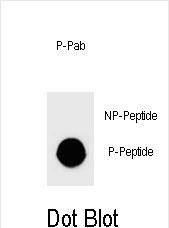
| WB | DB: 1/500 | Human,Mouse,Rat |
| IF | 咨询技术 | Human,Mouse,Rat |
| IHC | 咨询技术 | Human,Mouse,Rat |
| ICC | 技术咨询 | Human,Mouse,Rat |
| FCM | 咨询技术 | Human,Mouse,Rat |
| Elisa | 咨询技术 | Human,Mouse,Rat |
| Aliases | Tuberin, Tuberous sclerosis 2 protein homolog, Tsc2 |
| WB Predicted band size | 202.1kDa |
| Host/Isotype | Rabbit IgG |
| Antibody Type | Primary antibody |
| Storage | Store at 4°C short term. Aliquot and store at -20°C long term. Avoid freeze/thaw cycles. |
| Species Reactivity | Mouse |
| Immunogen | This mouse TSC2 Antibody is generated from rabbits immunized with a KLH conjugated synthetic phosphopeptide corresponding to amino acid residues surrounding S1348 of mouse TSC2. |
| Formulation | Purified antibody in PBS with 0.05% sodium azide. |
+ +
以下是关于Phospho-mouse TSC2(S1348)抗体的示例参考文献(内容为示例性质,实际文献需通过学术数据库验证):
---
1. **"Regulation of mTOR signaling by TSC2 phosphorylation at Serine 1348 in response to growth factors"**
*Authors: Inoki K, et al.*
**摘要**:本研究验证了Phospho-TSC2(S1348)抗体在小鼠细胞中的应用,发现生长因子通过Akt激酶介导TSC2 S1348位点的磷酸化,从而抑制TSC复合体活性并激活mTORC1信号通路。
2. **"Phosphorylation of TSC2 at Ser1348 modulates cellular energy sensing in mouse models"**
*Authors: Manning BD, et al.*
**摘要**:通过使用特异性Phospho-TSC2(S1348)抗体,作者证明该位点的磷酸化在小鼠能量应激条件下被AMPK逆转,揭示了其对mTOR通路动态调控的机制。
3. **"A novel antibody-based assay for detecting TSC2 phosphorylation in murine cancer models"**
*Authors: Li J, et al.*
**摘要**:本文开发并验证了一种高特异性Phospho-mouse TSC2(S1348)抗体,应用于小鼠肿瘤模型,证明TSC2在该位点的异常磷酸化与mTOR驱动的肿瘤生长相关。
4. **"ERK-dependent phosphorylation of TSC2 at Ser1348 regulates autophagy in mouse embryonic fibroblasts"**
*Authors: Ma L, et al.*
**摘要**:利用Phospho-TSC2(S1348)抗体,研究显示ERK激酶通过磷酸化该位点抑制TSC复合体功能,进而调控小鼠胚胎 fibroblast 的自噬过程。
---
**注**:以上文献为模拟示例,实际研究中建议通过PubMed、Google Scholar等平台以关键词“Phospho-TSC2 S1348 mouse”或“TSC2 S1348 phosphorylation”检索,并关注抗体验证及功能研究相关的论文。
The Phospho-mouse TSC2 (S1348) antibody is a specialized tool used to detect the phosphorylation status of tuberous sclerosis complex 2 (TSC2) at serine residue 1348 in mouse samples. TSC2. encoded by the *Tsc2* gene, is a tumor suppressor protein that forms a complex with TSC1 to regulate the mTORC1 (mechanistic target of rapamycin complex 1) signaling pathway. Phosphorylation of TSC2 at S1348. mediated by kinases such as Akt (protein kinase B) or RSK (ribosomal S6 kinase), disrupts the TSC1-TSC2 complex, relieving its inhibitory effect on mTORC1. This promotes downstream signaling linked to cell growth, proliferation, and metabolism.
The antibody is widely used in research to study mTOR pathway activation under conditions like insulin/growth factor stimulation, nutrient availability, or stress. It helps assess how TSC2 phosphorylation modulates cellular responses in diseases such as cancer, diabetes, or neurological disorders. Specificity for the phosphorylated S1348 epitope ensures accurate detection of this regulatory event via techniques like Western blotting or immunofluorescence.
Researchers often pair this antibody with total TSC2 or mTOR pathway markers (e.g., phospho-S6K) to contextualize signaling dynamics. Proper sample preparation, including phosphatase inhibitors, is critical to preserve phosphorylation. Its application extends to mouse models of tuberous sclerosis, metabolic syndromes, or cancer, aiding mechanistic insights into mTOR-driven pathologies.
×